Orenda第四周:没动力改变?从小习惯入手吧!



!
小习惯成就大格局

儿子把这篇《没动力改变?从小习惯入手吧!》的英文文章寄给我已经好几个星期了,我一直想等有时间再看,再翻译。这一等,好几个星期就过去了。
昨天儿子给我发信息,说他们这个季节为期12周的青少年辅导班今天结业,他邀请我去现场观摩他们的活动,看看学生们都怎么说。我这才意识到,他们的活动都临近尾声了,我翻译的一半还没到呢,深感愧疚。
赶紧把这篇文章找出来翻译,读完之后才感觉,他们介绍的斯坦福大学教授BJ Fogg 讲的“建立小习惯”这个技巧,其实对拖拉的我,太需要学习了!
为什么我能拖拉这么久?因为读他的文章,很多概念对我来说都不熟悉,我要先消化,理解,才能翻译。也就是说,翻译他的文章不那么容易,有点费事。于是我无意识地就往后“拖”。
读了他的文章后,我认识到,这个“从小习惯入手”的技能的确不错,对于改变拖拉的习惯,会有帮助,是我今后努力的方向。
从今以后,我要练习建立“小习惯”。比如他的文章来了,我要建立如下习惯:
1. 先建个folder,把他的文章放进去。
2. 找时间先粗粗地看一遍,了解一下他文章的内容。
3. 消化翻译。
我最后的目标是:他给我的文章在一周之内我就阅读翻译完毕,争取改变自己拖拉这个坏习惯。
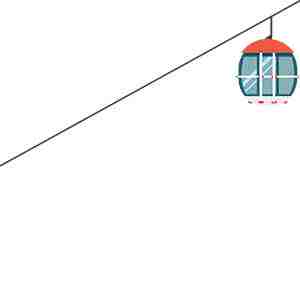
Orenda辅导第四周:从小习惯入手
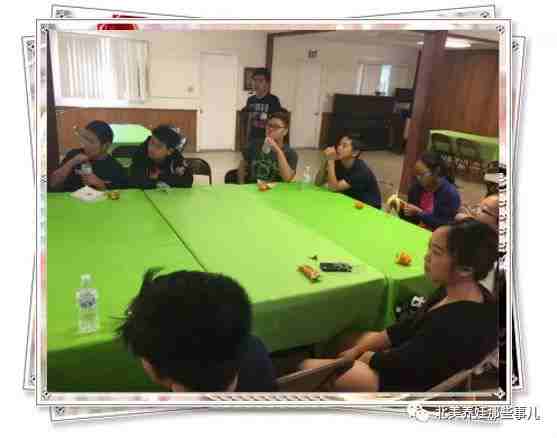
翻译:阿朵 / 原文:Carl Shan
在Orenda第三周的活动中,我们的学生们思考分享了他们的核心价值观是什么,学生们参加了我们组织的美国宾夕法尼亚大学大学商学院教授Richard Shell 创意的“六种人生”的活动。
在这个活动中,学生读了六种不同的人生,并给这六种不同的人生打分。写下在他们看来,哪种人生是最成功的,哪种人生是最不成功的,学生们同时写下对他们来说,什么是最重要的。
在这一周里,我们要和学生们一起,把他们的想法变成行动:如何建立一个良好的的习惯以帮助他们达到自己的目标。

我小的时候,我总觉得我需要很大的动力和自律才能达到我想要达到的目标。因为我习惯回到家后先从冲到计算机旁玩游戏,作业留在最后才做。我总觉得缺乏动力是我成功的巨大障碍。
在一定程度上,是这么回事,没有动力和自律,会阻碍一个人达到自己的目标。
但我从来就不知道,有另外一种方式也可以让我逐渐摆脱游戏,回归作业。那种方式只需要一点点的努力,不需要很大的动力。
这听起来不可能,是吧?
我多希望我小的时候,有人这样告诉我:其实你需要的动力,并不一定像你想象的那么大。那时我一定试试!
是的,的确有一种方法可以帮助提高效率,而不必依靠那不可思议的意志力。
这就是我们本周要教学生的内容:从小习惯入手。

你同不同意,潜意识里对我们的行为产生巨大影响的力量,就是我们的习惯?它们存在于我们的浅意识里,影响着我们的行为,直接指导着我们的心理模式,同时几乎不需要心理上很大的努力。
现在有很多畅销书籍,都讲述关于习惯形成的科学和模式,以及它们是如何塑造我们日常生活的。
想想吧,我们每天都做着成千上万的小事情,都不需要有任何明显的努力。比如我每天早晨起床后,淋浴,刷牙,做牙线,服用一颗维生素。然后做早餐,穿好上班的服装,在iPhone应用程序中记录下我的体重,今天吃了多少。
整个上午,我甚至都没注意到我自己做了这些事情,它们自然而然地就发生了,这就是习惯的力量。
习惯似乎是对我们许多日常行为进行了代码编程,我们只是机械地执行而已。
如果我们可以教会学生如何利用习惯的力量,那么我们最终就可以帮助学生学会如何有效地利用他们的时间,甚至在他们的内动力还没有那么大的时候。

斯坦福大学教授BJ Fogg 2012年在TEDx发表了演讲,他演讲的的YouTubea TEDx talk in 2012获得近100万次观看。

在演讲中,BJ Fogg分析了如何不需要强大的动力,就可以建立可持续性的积极的习惯,在他的谈话和写作中,他分享了这个简单的方程:
行为=动力+能力+触发
如果我们想要建立一个新的行为习惯,但又没有很大的动力,那么我们可以基于现有的行为,寻找简单易做的事,从小事开始入手。BJ Fogg称这些为“微小的习惯”。
举个例子,如果我每次从学校回家时,想建立一个做家庭作业的新习惯,开始这个行为,我需要很大的动力,因为我已经习惯了先玩游戏。
但是我们可以一开始不把目标放的那么大,首先我可以从我的书包中拿出作业本,把它们放在桌子上,从建立这个“微小的习惯”开始。
我不必立刻就开始做作业,我只需要把作业本拿出来放到桌子上。之后,我仍然可以玩视频游戏,吃点东西,或者做任何我想要做的事情。这个动作没有花费我太多的时间和精力。
这种习惯建立一两个星期后,就会在我们的日常生活中变得根深蒂固,它会像我们要刷牙一样习以为常。这个时候,我们就可以在此之上再建立另一个“微小的习惯”:先做最简单的作业,先回答第一个问题,或者只是按照我想要做的作业的顺序,把作业本放好。
通过慢慢地建立这些“微小习惯”,我们就可以建立可持续的,转变性的习惯。其实分解看来,这些微小行为每天做一次,需要你不到30秒的时间,只需要你一点点的努力,都挺容易的。但所有这些微小复加在一起时,这些习惯最终就会大大地改变我们的生活。
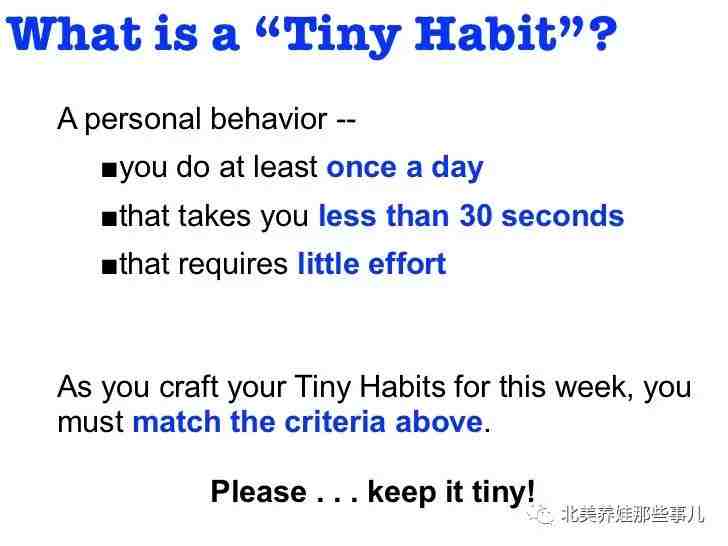
我们的教练会记下每个学生要培养的习惯是什么,下次1对1和学生见面的时候,他们会跟踪检查。
所有学生都选择一个习惯,每天做5次俯卧撑,当他们到家时先打开书包。
每个学生都致力于尝试培养他们的“微小习惯”一个星期,并要向我们汇报他们的进步,这样他们的教练就能够和他们配合加以引导,制定更长远一点的计划来达到他们的目标。
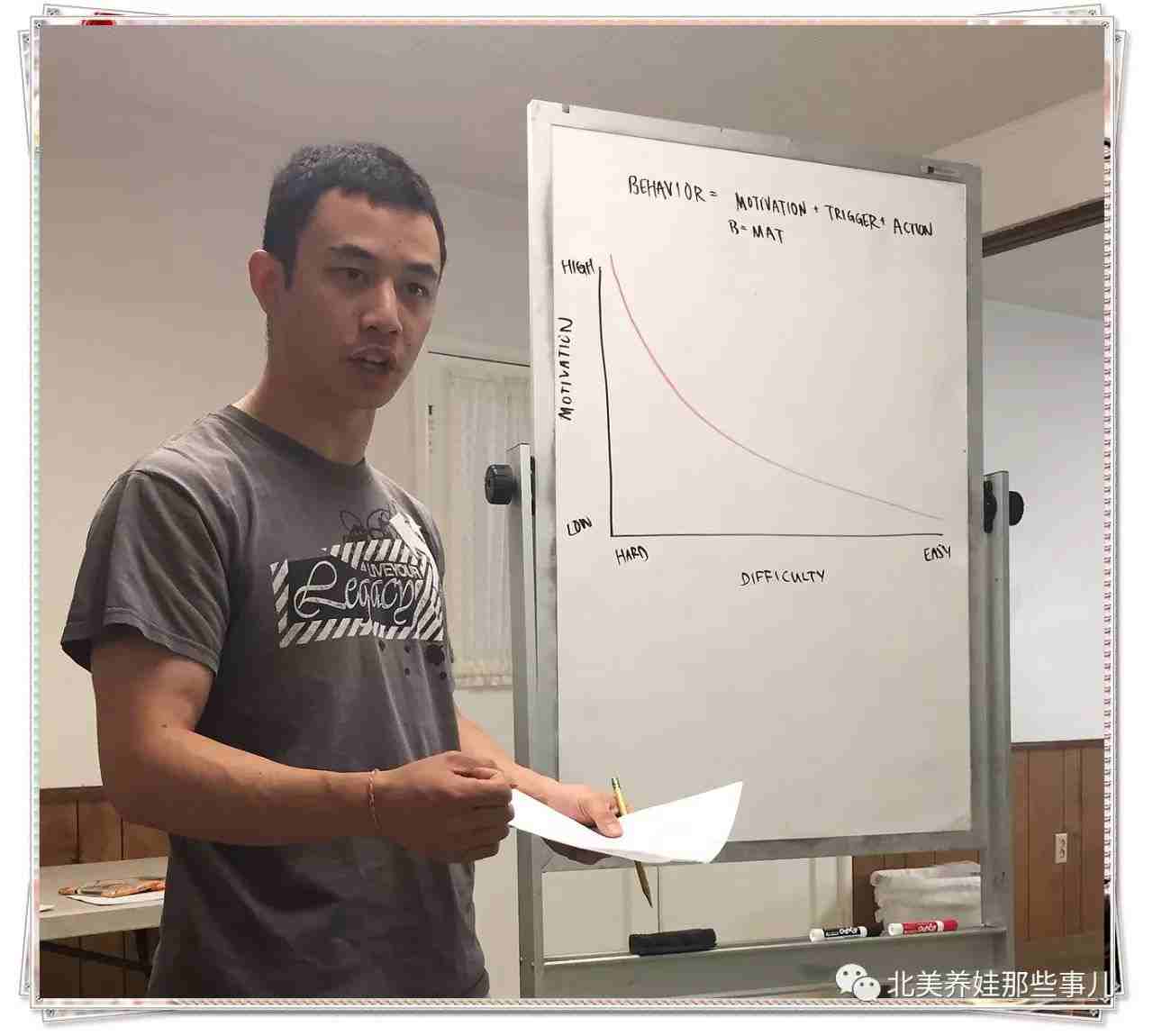

我们的辅导是一环扣一环的,这周学生们把他们长远目标转化为他们可以练习的“小习惯”。 我们的目的是要把学生们的大格局,从技术上做战略战术的准备,以帮助他们实现目标。
我们的学生们都非常喜欢我们这次课程练习,他们说这是目前为止他们最喜欢的一次活动。我们很高兴也很自豪可以帮到学生,使他们朝着他们理想的目标 迈进。

Orenda活动不仅仅是引导学生,家长的思维上也需要做一些相应的调整和配合。要不然,孩子在努力,在调整,如果家长看不到这些,还习惯于以往“批评”式的沟通方式 ,那也达不到很好的效果。
我们下周的活动是专门为家长准备的。我们将邀请一些年轻的专业人士和演讲嘉宾与父母们分享,从年轻人的角度看,如何沟通才能让孩子听得进去,才能更有效地与孩子们建立良好的关系。欢迎家长们腾出时间来参加。

我们目前辅导的学生名额已满,如果你对2018年春季的辅导课程感兴趣,请填写申请表(2018辅导班名额有限,申请截止日期:1/7/2018):
https://docs.google.com/forms/d/e/1FAIpQLScCvg-kFPZ2HFXrYzkz0cX7I5TwJUwHAK9dWf7ll0uA7UQeBw/viewform
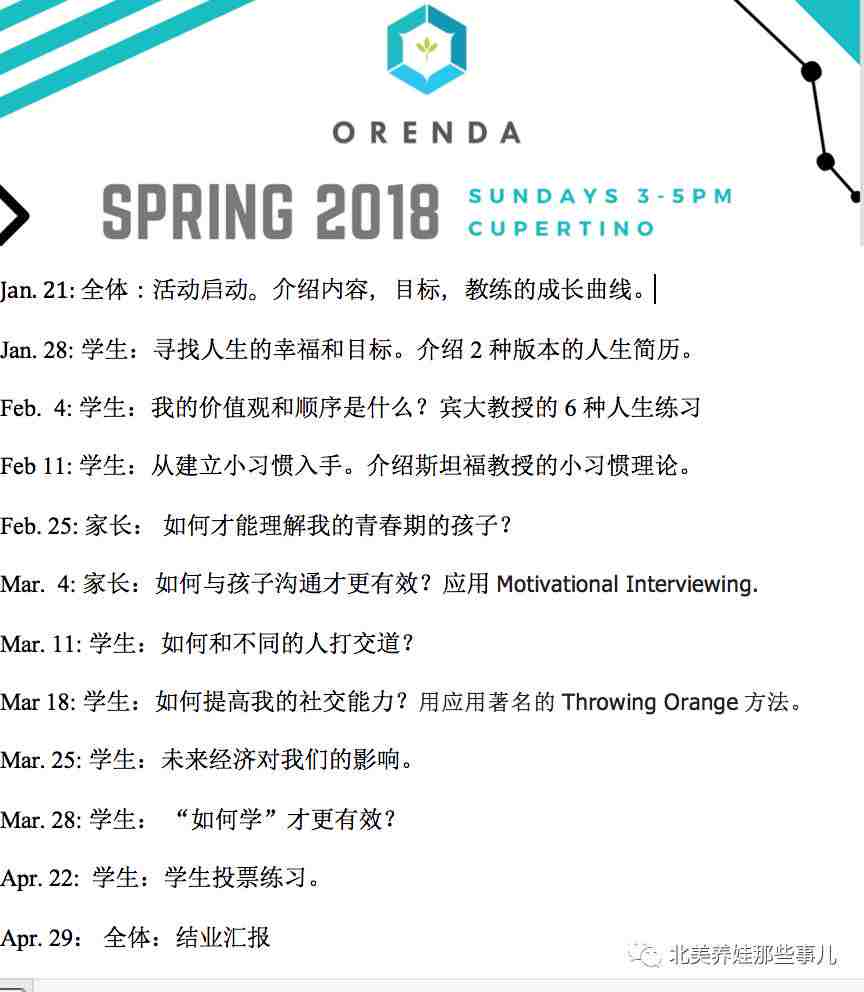
我们也有少量online异地辅导名额,感兴趣者请寄邮件:[email protected]

Orenda Week 4 Tiny Habits
October 2, 2017
Carl Shan
In Week 3 of Orenda’s group session, students thought, reflected and shared about what their core values are. Students participated in an activity called the 6 Lives Exercise, invented by Professor Richard Shell at the University of Pennsylvania’s Wharton School of Business. In this activity, students read about the lives of six different professionals, each of whom exemplified a different dimension of “success” in life and ranked these profiles from “most successful” to “least successful.” They shared with each other why they ranked the profiles they way they did, revealing things that are important to them.
Why you don’t need as much motivation as you thought
When I was younger I thought that I needed more motivation and self-discipline in order to achieve what I wanted. Because I saw myself as very lazy (I would procrastinate homework until the last minute, cramming in as much video game time as possible), I always thought that my lack of motivation was a huge barrier to success. In many ways that’s still true. The absence of motivation and self-discipline is likely to hurt a person’s chances at achieving their goals.
But I had never considered the possibility that there may be other ways of making myself get off the computer to do work. Ways that required little to no motivation. Does that sound impossible to you? It certainly would have to me if you had told me when I was a teenager.
And yet there is a way to become more productive, effective and deliberate with how we spend our time without relying on incredible amounts of willpower.
This is what we wanted to teach our students this week.
How do we build successful habits?
One of the most powerful forces that shape our behavior does so subconsciously. These are our habits. They exist beneath the surface of our conscious mind to influence our behaviors anddirect our mental patterns all the while taking nearly no mental effort. Bestselling books have been written on the science and patterns of habit formation and how they shape our everyday lives.
Think about it. There are a million small things that we do throughout the day, every day, without exerting any noticeable effort. Each morning I brush my teeth, shower, floss and take my vitamins. I then get dressed for work, make and eat breakfast and then record in an iPhone app my weight and how much I’ve eaten. Throughout the morning, I don’t even notice myself taking these actions; they just happen. And that’s the power of habits. They are the invisible lines of code that program many of our daily behaviors.
If we can teach students how to harness the power of habits, then we could sidestep the issue of low motivation and still end up helping students use their time wisely and productively.
Stanford Professor BJ Fogg’s research on Tiny Habits
Stanford Professor BJ Fogg gave a TEDx talk in 2012 that has since garnered nearly 1 million views on YouTube. In the talk, he breaks down the recipe behind how to build sustainable, positive habits without needing massive doses of motivation. In his talk and writing he shares this simple equation:
Behavior = Motivation + Ability + Trigger
If we want to build new behaviors, and we also don’t have high motivation, we can simply look for tasks that are easy to do (high ability) and are based off of an existing trigger behavior. BJ Fogg calls these tasks “Tiny Habits.”
For example if I wanted to build a new habit of doing my homework every time I came home from school, it would take me an enormous amount of motivation in order to even begin. But instead of trying to build this habit from the start, I could instead start by building the “Tiny Habit” of taking out my homework from my backpack and putting it on the table. I don’t have to start doing them, I just need to get into the routine of placing them in front of me. Afterwards, I can play video games, eat food or do whatever I want to. This action would take me nearly no time or effort.
After a week or two of building this habit, it’ll probably become ingrained in my routine. It’ll become as frictionless as brushing my teeth. That’s when we build on top of it. Now I can establish another “Tiny Habit” on top. Perhaps that means doing just the first problem on my easiest assignment. Or perhaps I now simply organize my work in the order that I want to do them in.
By slowly layering “Tiny Habits” on top of one another we can build sustainable, transformative behaviors that are each individually easy, but when taken in composite, end up dramatically transforming our lives.
This week in Orenda, each student learned BJ Fogg’s technique and came up with at least 6 different “Tiny Habits” that would help them achieve the goals they set last week. Afterwards, they picked one to focus on this coming week. Their coaches were made aware of what the students chose so that their coaches could check in and see how much progress was made during 1 on 1 meetings.
Students chose habits ranging from doing 5 push ups each day to just opening up their backpack when they arrived home. Each student committed to trying their “Tiny Habit” for one week and reporting back their progress so that their coaches can work with them to come up with plans to build on their ideas.
Next Week
During Week 4, students took their big life visions and turned them into bite-sized “Tiny Habits”they could practice. Students went from the big picture to the tactical implementation that would help them achieve their goals.
Our students deeply enjoyed our session, rating it the best session we’ve had so far. We are happy and proud to see our students learning about research and ideas that can help them achieve their goals and are excited to see where that takes them.
Next week, we will have a private invite-only session for parents, where we will be inviting a panel of young professionals and speakers to share ideas with our parents about how they can more effectively build a strong relationship with their child.
Ifyou are interested in learning more about
participatingin Orenda Academy, please fill out this link:
Spring 2018 Interest Form
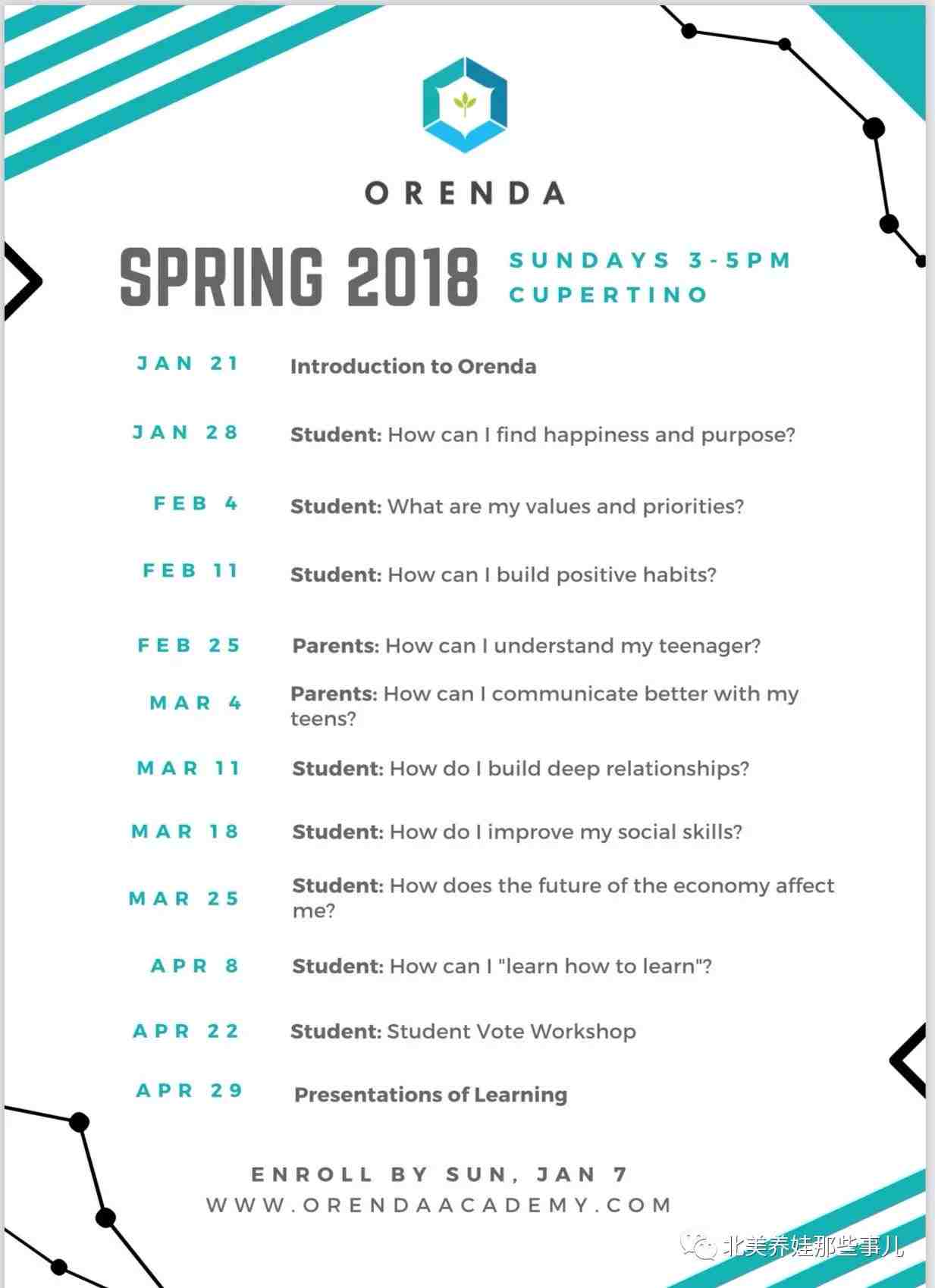
Weare also holding a limited number of spots for Spring 2018 virtual coachingwhere coaches work online with students located outside of the Bay Area. Pleaseindicate if you are interested. You can also email us at carl[at]orendaacademy.com.
英文原文:
https://www.orendaacademy.com/orenda-blog/2017/10/02/Orenda-Fall-2017-Week-4-Tiny-Habits

作者简介:阿朵,生活在美国硅谷的普通码工。大学,研究生学的是都是工科,心里却有一个文学梦。
1997年来到美国,体验着中美两国文化的差异,养育着四个生龙活虎的儿子,也被儿子们锤炼着,教育着,随笔记下生活中和孩子一起成长的点点滴滴。
作品发表在美国《星岛日报》,《侨报》,《美国都市报》,《北京菁Kids》杂志。文章被收集在清华大学出版社出版的海外文轩文集《教育,还可以。。。》《生活,还可以。。。》。
版权归作者所有,转载请联系作者。
阅读更多公众号文章,点击左下角“Read More”。
更多文章,都是原创!
Orenda年轻人辅导青少年分享:
家长分享:

《北美养娃那些事儿》
立足硅谷,放眼世界。《北美养娃那些事儿》由北美家长分享养儿育女,申请大学,家长和孩子共同成长的真实故事。
关注《北美养娃那些事儿》, 扫码吧。
欢迎大家一起分享!投稿请寄[email protected]
最新评论
推荐文章
作者最新文章
你可能感兴趣的文章
Copyright Disclaimer: The copyright of contents (including texts, images, videos and audios) posted above belong to the User who shared or the third-party website which the User shared from. If you found your copyright have been infringed, please send a DMCA takedown notice to [email protected]. For more detail of the source, please click on the button "Read Original Post" below. For other communications, please send to [email protected].
版权声明:以上内容为用户推荐收藏至CareerEngine平台,其内容(含文字、图片、视频、音频等)及知识版权均属用户或用户转发自的第三方网站,如涉嫌侵权,请通知[email protected]进行信息删除。如需查看信息来源,请点击“查看原文”。如需洽谈其它事宜,请联系[email protected]。
版权声明:以上内容为用户推荐收藏至CareerEngine平台,其内容(含文字、图片、视频、音频等)及知识版权均属用户或用户转发自的第三方网站,如涉嫌侵权,请通知[email protected]进行信息删除。如需查看信息来源,请点击“查看原文”。如需洽谈其它事宜,请联系[email protected]。